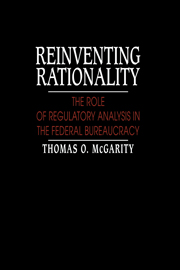Book contents
- Frontmatter
- Contents
- Acknowledgments
- Abbreviations
- Introduction
- Part I The clash of regulatory cultures
- Part II Regulatory analysis in theory and practice
- 3 Getting the lead out of gasoline: EPA's lead phasedown regulations
- 4 Getting the dust out of the air: EPA's ambient air quality standard for particulate matter
- 5 Getting obstructions out of the driver's view: NHTSA's field of direct view regulations
- 6 Getting the bone out of processed meat: FSIS's mechanically separated meat standard
- 7 Getting information into hazardous workplaces: OSHA's hazard identification regulations
- 8 The virtues of regulatory analysis
- 9 Limitations of regulatory analysis
- 10 Regulatory analysis in the real world
- Part III Structuring regulatory analysis into the decisionmaking process
- Part IV Review of regulatory analysis
- Part V Conclusions
- Notes
- Bibliography
- Index
9 - Limitations of regulatory analysis
Published online by Cambridge University Press: 16 October 2009
- Frontmatter
- Contents
- Acknowledgments
- Abbreviations
- Introduction
- Part I The clash of regulatory cultures
- Part II Regulatory analysis in theory and practice
- 3 Getting the lead out of gasoline: EPA's lead phasedown regulations
- 4 Getting the dust out of the air: EPA's ambient air quality standard for particulate matter
- 5 Getting obstructions out of the driver's view: NHTSA's field of direct view regulations
- 6 Getting the bone out of processed meat: FSIS's mechanically separated meat standard
- 7 Getting information into hazardous workplaces: OSHA's hazard identification regulations
- 8 The virtues of regulatory analysis
- 9 Limitations of regulatory analysis
- 10 Regulatory analysis in the real world
- Part III Structuring regulatory analysis into the decisionmaking process
- Part IV Review of regulatory analysis
- Part V Conclusions
- Notes
- Bibliography
- Index
Summary
The description in Chapter 8 of the virtues of regulatory analysis presents an ideal view of comprehensive analytical rationality. As might be expected, the ideal suffers considerably in the real world where values conflict, the available information is never adequate, and quantitative techniques encounter huge uncertainties. Many students of government urge instead more realistic notions of “bounded rationality”. Because analysis is expensive and information-intensive, decisionmakers, in this view, can only muddle through by exploring a very limited range of options, relying heavily upon intuition and “back-of-the-envelope” predictions, and hoping for rapid feedback to meet limited short-term goals. Critics maintain that politics is inseparable from bureaucratic decisionmaking, and purely instrumental techniques deprive it of an important democratic dimension. One prominent student of the bureaucratic process has observed:
The notion of some analysts that knowledge will carry the day is absurd. Knowledge does not and cannot govern. The diversity of our society and institutions sets the conditions for conflicting values to be maintained. Once we realize that problems of public policy are not solved but adjusted by policymakers, then it should be clear that the degree of trust within our society is equally as important as knowledge.
Regulatory analysts react very negatively to such suggestions, arguing that an informed decision is always better than one made in ignorance. They argue that analysis enhances democratic accountability by forcing agencies to make explicit value choices. Yet, as a purely descriptive matter, the muddling through model often appears to fit the decisionmaking process better than the comprehensive analytical rationality paradigm.
- Type
- Chapter
- Information
- Reinventing RationalityThe Role of Regulatory Analysis in the Federal Bureaucracy, pp. 124 - 164Publisher: Cambridge University PressPrint publication year: 1991



